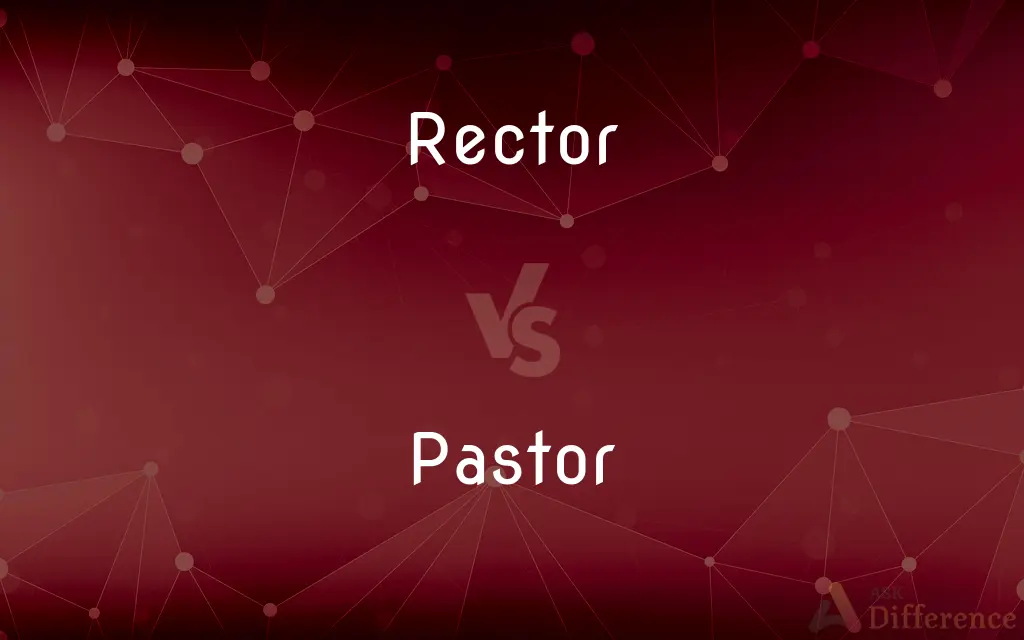Rector vs. Pastor — What's the Difference?
Edited by Tayyaba Rehman — By Urooj Arif — Updated on April 1, 2024
A rector is a clergy member leading an Episcopal parish, while a pastor serves as a spiritual leader in various Christian denominations.

Difference Between Rector and Pastor
Table of Contents
ADVERTISEMENT
Key Differences
A rector typically refers to the head of a parish in the Anglican, Episcopal, and some Roman Catholic churches. The role involves administrative responsibilities, spiritual guidance, and leading worship services. On the other hand, a pastor, used more broadly across Christian denominations, focuses on providing spiritual care, teaching, and leading a congregation in faith.
Rectors are often appointed by a bishop or a governing body within the church, reflecting the hierarchical structure of the denomination. Pastors, however, may be elected by their congregation or appointed by church leaders, depending on the denomination's governance.
While both roles involve preaching, the term rector carries specific administrative and ceremonial duties, especially in Episcopal and Anglican contexts. Pastors, while they may also handle administrative tasks, are primarily seen as spiritual shepherds, guiding their flock in personal and community faith.
The title "rector" is used more commonly in denominations with historical ties to the Church of England, highlighting the traditional aspects of their liturgical practice. The title "pastor" is more universally recognized across Christian churches and emphasizes the pastoral care and leadership aspects of the role.
Despite these differences, both rectors and pastors share the common goal of leading their communities in spiritual growth, worship, and service, each within the framework of their denomination's traditions and governance.
ADVERTISEMENT
Comparison Chart
Definition
A clergy member leading an Episcopal or Anglican parish.
A spiritual leader serving in various Christian denominations.
Primary Role
Administrative leadership, spiritual guidance, liturgical duties.
Spiritual care, teaching, community leadership.
Appointment
By a bishop or church governing body.
Elected by congregation or appointed by church leaders.
Common in
Anglican, Episcopal, some Roman Catholic Churches.
Broadly across Christian denominations.
Focus
Ceremonial and administrative duties in a parish.
Pastoral care, guidance, and spiritual teaching.
Compare with Definitions
Rector
Appointed by higher ecclesiastical authority.
The bishop appointed a new rector for the parish.
Pastor
A spiritual leader who cares for a congregation.
The pastor delivered a moving sermon about compassion.
Rector
The priest in charge of a parish in the Anglican Church.
The rector led the Sunday service at the cathedral.
Pastor
Involved in teaching and guiding the community in faith.
The pastor leads Bible study sessions every Wednesday.
Rector
A clergy member with administrative duties.
As a rector, he was responsible for overseeing the church's budget.
Pastor
Serves across various Christian denominations.
The pastor of the local Baptist church is very involved in community outreach.
Rector
Leads in liturgical responsibilities.
The rector officiated the marriage ceremonies and baptismal services.
Pastor
Focuses on pastoral care and spiritual guidance.
The pastor visited sick members of the congregation to offer prayers and support.
Rector
Often associated with churches having historical ties to the Church of England.
The rector’s role is significant in Episcopal churches.
Pastor
May be elected by the congregation.
The church members elected a new pastor after the former pastor retired.
Rector
(in the Church of England) the incumbent of a parish where all tithes formerly passed to the incumbent.
Pastor
A pastor (abbreviated as "Pr" or "Ptr" {singular}, or "Ps" {plural}), is the leader of a Christian congregation who also gives advice and counsel to people from the community or congregation. In Lutheranism, Catholicism, Eastern Orthodoxy, Oriental Orthodoxy and Anglicanism, pastors are always ordained.
Rector
The head of certain universities, colleges, and schools.
Pastor
A Christian minister or priest having spiritual charge over a congregation or other group.
Rector
A cleric in charge of a parish in the Episcopal Church.
Pastor
A layperson having spiritual charge over a person or group.
Rector
An Anglican parish priest in a parish where historically the priest was entitled to the tithes.
Pastor
(Archaic) A shepherd.
Rector
A Roman Catholic priest appointed to be managerial as well as spiritual head of a church or other institution, such as a seminary or university.
Pastor
To serve or act as pastor of.
Rector
The principal of certain schools, colleges, and universities.
Pastor
A shepherd; someone who tends to a flock of animals.
Rector
In the Anglican Church, a cleric in charge of a parish and who owns the tithes of it.
Pastor
Someone with spiritual authority over a group of people
Rector
In the Roman Catholic Church, a cleric with managerial as well as spiritual responsibility for a church or other institution.
Pastor
(Protestantism) A minister or priest in a church.
Rector
A priest or bishop who is in charge of a parish or in an administrative leadership position in a theological seminary or academy.
Pastor
The main priest serving a parish.
Rector
In a Protestant church, a pastor in charge of a church with administrative and pastoral leadership combined.
Pastor
A bird, the rosy starling.
Rector
A headmaster in various educational institutions, e.g. a university.
Pastor
To serve a congregation as pastor
Rector
(Scotland) An official in Scottish universities who heads the university court and is elected by and represents the student body.
Pastor
A shepherd; one who has the care of flocks and herds.
Rector
A ruler or governor.
God is the supreme rector of the world.
Pastor
A guardian; a keeper; specifically (Eccl.), a minister having the charge of a church and parish.
Rector
A clergyman who has the charge and cure of a parish, and has the tithes, etc.; the clergyman of a parish where the tithes are not impropriate. See the Note under Vicar.
Pastor
A species of starling (Pastor roseus), native of the plains of Western Asia and Eastern Europe. Its head is crested and glossy greenish black, and its back is rosy. It feeds largely upon locusts.
Rector
The head master of a public school.
Pastor
A person authorized to conduct religious worship
Rector
The chief elective officer of some universities, as in France and Scotland; sometimes, the head of a college; as, the Rector of Exeter College, or of Lincoln College, at Oxford.
Pastor
Only the rose-colored starlings; in some classifications considered a separate genus
Rector
The superior officer or chief of a convent or religious house; and among the Jesuits the superior of a house that is a seminary or college.
Rector
A person authorized to conduct religious worship
Common Curiosities
Can a rector also be called a pastor?
Yes, in some contexts, the terms can be interchangeable when a rector performs pastoral duties, though "rector" has a more specific administrative connotation.
What are the pastoral duties of a pastor?
Pastoral duties include preaching, teaching, offering spiritual guidance, visiting the sick, and leading community service efforts.
Is the appointment of pastors the same in all Christian denominations?
No, the process varies; some pastors are elected by their congregation, while others are appointed by denominational leaders or a higher ecclesiastical authority.
Do rectors and pastors perform the same religious ceremonies?
They often perform similar ceremonies like weddings, funerals, and baptisms, but the specific rites and liturgies may differ based on denomination.
What kind of education is required to become a pastor?
Educational requirements vary, but many pastors hold a divinity degree or have undergone theological training.
What is the main difference between a rector and a pastor?
The main difference lies in their roles and the context within which they serve; rectors are primarily in Episcopal and Anglican Churches with specific administrative duties, while pastors offer spiritual guidance across various denominations.
Can a rector serve in a non-Episcopal church?
The title "rector" is traditionally used in Episcopal, Anglican, and some Roman Catholic contexts, so it's less common outside these denominations.
What role do pastors play in the spiritual development of their congregation?
Pastors play a crucial role in spiritual development by providing guidance, teaching, and support to help individuals grow in their faith.
Do rectors and pastors need to be ordained?
Yes, both roles typically require ordination within their respective Christian traditions.
How does one become a rector?
Becoming a rector typically requires ordination in the Episcopal or Anglican Church and appointment by a bishop or governing body.
Are rectors involved in community outreach?
Yes, like pastors, rectors often engage in community outreach, though their primary responsibilities may lean more towards administrative and liturgical duties.
Can women serve as rectors or pastors?
This depends on the denomination; some Christian traditions ordain women as rectors or pastors, while others do not.
How do the responsibilities of a rector and a pastor differ in a service?
In a service, a rector might focus more on liturgical elements and ceremonies, while a pastor's role might emphasize preaching, teaching, and pastoral care.
What impact do rectors and pastors have on their communities?
Both rectors and pastors have a significant impact on their communities through spiritual leadership, support during life events, and guidance in moral and ethical matters.
How does the congregation interact with a rector compared to a pastor?
While interaction styles can vary widely across churches, congregations may engage more with pastors on personal and spiritual matters due to the pastoral nature of their role, whereas interactions with rectors might include more administrative or ceremonial contexts.
Share Your Discovery

Previous Comparison
Feedback vs. Response
Next Comparison
Scene vs. ScenarioAuthor Spotlight
Written by
Urooj ArifUrooj is a skilled content writer at Ask Difference, known for her exceptional ability to simplify complex topics into engaging and informative content. With a passion for research and a flair for clear, concise writing, she consistently delivers articles that resonate with our diverse audience.
Edited by
Tayyaba RehmanTayyaba Rehman is a distinguished writer, currently serving as a primary contributor to askdifference.com. As a researcher in semantics and etymology, Tayyaba's passion for the complexity of languages and their distinctions has found a perfect home on the platform. Tayyaba delves into the intricacies of language, distinguishing between commonly confused words and phrases, thereby providing clarity for readers worldwide.














































